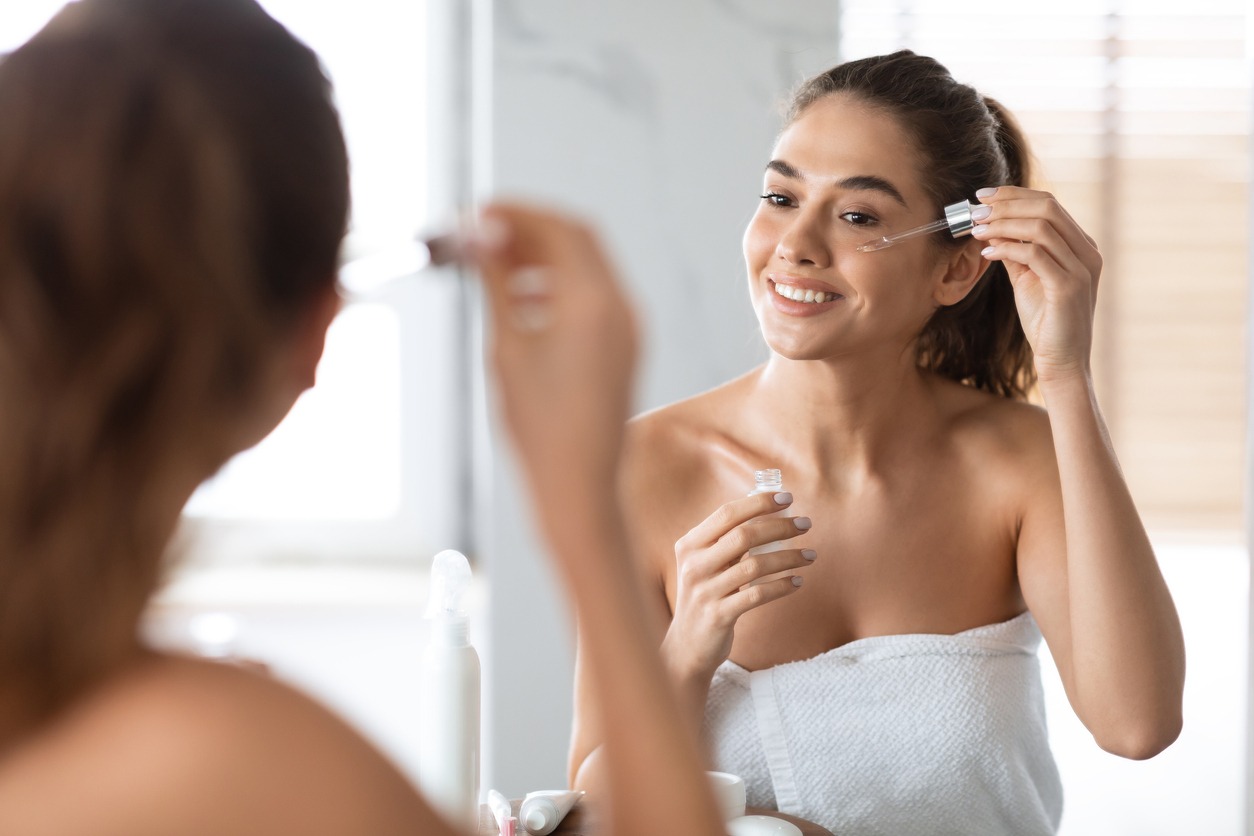When you don’t know your skin type, picking a skin care regimen can feel like a game of snakes and ladders. In selecting a skin care regimen, it is important to consider factors such as skin type, personal habits, skin tone, and specific demands. Furthermore, you should see a dermatologist if you have any concerns about your skin.
When looking for an over the counter (OTC) skin care product, trusting your judgment is the most crucial factor to consider. You are the only person who truly understands your skin. But before you go out and buy a ton of skincare products, educating yourself on your skin type is a good idea. You might waste time and money searching for the best skin care products.
Choosing Skincare Products for Your Skin Type
Whether we go to a physical store or do some research online, we may find a wide variety of skincare products to choose from. Unfortunately, the proliferation of beauty gurus pushing new releases only serves to confuse customers further. There’s a technique to know exactly what your skin needs, even if you need to look up what each ingredient does for your skin. What follows is a guide to picking out a skincare regimen that will work well with your unique skin. Skincare products have come a long way, and it should be easy to pick the ideal one.
1. Know Your Skin Type
The first step in selecting the best skin care products is identifying your skin type. There are five main skin kinds, each with its own unique set of wants and requirements. To get the best effects from skincare products, you should know your skin type before making a purchase. Businesses put a lot of thought into creating skincare products with ingredients that target certain skin concerns. You may have to be patient before seeing benefits, but if you use the appropriate components, your skin will reward you in the long run.
a. Dry Skin – Moisturizers and other hydrating skincare items are a must if your skin is dry. Extreme weather conditions like dry heat and cold, windy days make it harder to care for this skin type. Moisturizing and replenishing lost moisture is the first defense against dry skin. If your skin doesn’t produce enough oil, you’ll need to add moisture elsewhere.
Hyaluronic acid is a fantastic component for dry skin since it helps the skin hold onto moisture and has a plumping impact on top of that. Aloe vera, like many other natural ingredients, has gained widespread popularity. Aloe vera has long been known for its ability to soothe sunburn, but now you know you can use it daily for its hydrating effects. Shea butter and lactic acid are two other ingredients to look for. Using these products regularly will help dry skin retain its radiance by hydrating and gently exfoliating it.
You should avoid any skincare routines or products that could irritate or dry up your skin. Glycolic acid and fragrances are substances to avoid when formulating treatments for dry skin. Experts strongly discourage foaming facials and other potentially harmful routines, such as frequent exfoliation, steamy showers, and extended sun time.
b. Oily and Acne Prone Skin – Too much sebum promotes clogged pores and acne; therefore, oily skin is also acne-prone. Remember to pick up some toner containing no alcohol. Alcohol is not effective against oily skin, contrary to popular assumption. While it’s true that alcohol can help keep the skin dry, it also promotes a buildup of dead cells, which then retain oil and leads to acne. Try witch hazel if you want a pore-tightening product that won’t dry out your skin.
Acne can only be avoided if oily skin is always kept clean. Retinol is a tried-and-true skincare ingredient you should try if you are experiencing a breakout. To reduce oiliness, it cleanses and closes pores. However, retinol makes your skin more vulnerable to UV light since it includes potent active ingredients. Many more spot treatments are also accessible on the internet if you like to concentrate on certain regions—these aid in controlling zits and blemishes without causing additional skin dryness.
c. Sensitive Skin – You probably have sensitive skin if your complexion quickly becomes red, irritated, and inflamed when you use new or different skin care products or if you break out easily. When you have sensitive skin, you risk experiencing irritation and redness if you don’t apply the right skincare products.
Make sure you only use mild products that are free of harsh chemicals. Because sensitive skin is so easily irritated, it’s important to use only mild skin care products. Natural products with beneficial elements like honey and shea butter should also be easy to find. Applying a new skincare product on your jaw first might help you determine if it will cause any adverse reactions, which is especially important if you have sensitive skin.
Products that reduce inflammation and add moisture are ideal for this skin type. Products containing lactic acid, aloe vera, and oat oil are very helpful for soothing sensitive skin and reducing redness and inflammation. Protecting the skin’s protective barrier is the best way to care for sensitive skin. A ceramide-based moisturizer is an optimal solution.
If you want to test new skincare products, you should opt for ones that don’t contain abrasive substances like benzoyl peroxide, salicylic acid, or retinol. Avoiding essential oils, perfumes, sulfate, and alcohol is also recommended by dermatologists and skin experts.
d. Combination Skin – The t-zone is the most common area of the face affected by the combination skin type since it is dry and oily. Using products meant for oily skin can make your T-zone even oilier while using products meant for dry skin can cause your normal skin to become overly dry. You may need to exercise more caution when caring for your skin than people with other skin types. Combination skin allows you to use a variety of treatments at once. If you have this skin type, it’s best to focus on problem areas and use targeted treatments. When dealing with this skin type, it’s best to apply specific treatments to the affected regions. Products made with salicylic acid, azelaic acid, and niacinamide are, therefore, ideal for use in the T-zone. Acne therapy and sebum production regulation are two areas where these substances shine.
e. Normal Skin – Although there is no one-size-fits-all approach to skincare, it is simpler to experiment with various products on skin that are normal. By definition, “normal” skin is not too dry, overly oily, or prone to breakouts. It’s the perfect skin tone for most people. Because of its well-rounded qualities, normal skin typically only experiences minor problems, such as acne and natural aging. Aside from that, even normal skin needs feeding, hydrating, exfoliating, and protection from UV radiation.
When making your selection, look for skin care products with active moisturizing components like glycerin, niacinamide, ferulic acid, ceramide, sodium hyaluronate, and polyhydroxy acids. Additionally, hyaluronic acid, retinoids, and vitamin C are also effective anti-aging compounds to seek out.
One of the most often used skincare ingredients that work well on regular skin is green tea. Thanks to its high antioxidant content, it helps delay the onset of wrinkles and other signs of aging. Green tea is beneficial for typical skin types because it maintains a healthy moisture balance while preventing excess oil production.
Investing in a high-quality sunscreen is the single most effective thing you can do to maintain youthful-looking skin. If you’re experiencing minor acne, try using a spot treatment so that the rest of your face can remain unaffected. Inappropriate or excessive use of skin care products can cause damage to even the healthiest skin. Exfoliating too much, or using retinol or hyaluronic acid excessively, might cause skin damage.
2. Avoid conforming to the masses
Finding products that work for your skin type is essential when creating a foundational skincare program. It’s easy to get carried away when the packaging, ratings, and recommendation of your favorite influencer are all in your favor. If you care about your skin, you should only settle for the best, regardless of the current trends. Consider the ingredients and their suitability for your skin type to get the greatest outcomes.
3. Pay Attention to Your Body Needs
Knowing when to pay attention to your body is essential to skin care. Consider what your skin requires and what your objectives are. Find out what you need and what elements can assist you in reaching your objectives. Select skincare products that effectively treat your skin issues, particularly those that concern you the most. The same is true for skincare regimens that have unpleasant side effects. Stop using the product immediately if you feel any burning, have any allergies, or have any negative side effects. Even though it could seem like a waste of money, it’s preferable to discomfort and other unwanted effects.
4. Know the ingredients you want for skin care
By looking at various ingredients, you can tell if a skincare product is suitable for your skin type. Despite having difficult chemical names, these compounds should be easy to memorize. Finding the best products for sensitive and acne-prone skin will be difficult. There should be more products accessible for oily skin types for those who have them.
Hyaluronic acid, benzoyl peroxide, and -hydroxy acids are your buddies if you have oily skin. These aid in regulating the sebaceous glands oil production, and hyaluronic acid also aids in hydrating the areas that require it. Those with sensitive skin should use more natural extracts that have been shown not to cause allergies. These include jojoba oil, shea butter, honey, aloe vera, chamomile, and calendula. Many of these components keep your skin moisturized while not clogging your pores. If you have dry skin, you want an exfoliator that effectively removes dead skin cells without further drying your skin. Your skin should benefit from shea butter, lactic acid, milk, ceramides, and aloe vera, among other things.
5. Always perform a patch test
A patch test is one of the simplest methods to determine if a skincare product is safe for you without purchasing the entire bottle. Never skimp on a patch test, and ensure that the seller offers one. If you’re purchasing from a physical store, a patch test should assist you in determining the product’s level of efficacy.
When making an online purchase, it is advisable to start using a new product with a sample or the smallest size available. Most businesses are delighted to sell a cheap trial pack to test it on your skin. It’s not for you if it bothers your skin. If you perform a DIY patch test, start by cleaning the area. Usually, you should begin on a small area of skin that you can leave unattended for 24 hours. Usually, this is the skin on the back of your hand, the inside of your forearm, or the back of your thigh.
Conclusion
Having a daily routine that includes a skincare routine is essential for both men and women today. The best thing you can do for your skin is to create a skincare regimen specifically for your skin type, despite all the early uncertainty and hassle. Testing and vigilance are the best approaches to choosing the best skin care item for your skin type. Know what you’re buying, what it’s made of, and whether it suits you. Finding the best skincare products for your skin with the best ingredients requires a personalized approach. Spending some extra time and energy on this is worth it.

